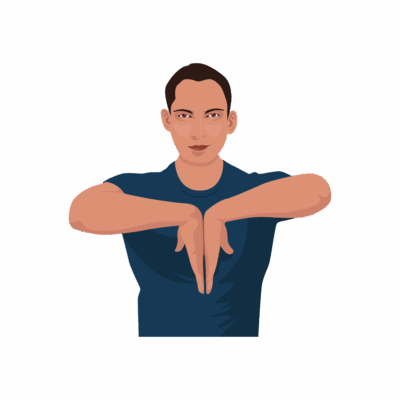Phalen’s Test
Phalen’s Test (Phalen’s Maneuver) is a physical exam commonly used to screen for carpal tunnel syndrome (CTS). It assesses irritation or compression of the median nerve as it passes through the carpal tunnel of the wrist.
How the Test is Performed
-
Client position: Seated, with arms relaxed.
-
The client maximally flexes both wrists and presses the dorsal sides of the hands together (“reverse praying hands” posture), keeping the fingers pointed down, elbows at chest level.
-
The position is held for up to 60 seconds.
-
During the test, the client is asked to report any symptoms (numbness, tingling, burning, or pain) in the thumb, index, middle finger, and lateral half of the ring finger.
-
Positive test: Reproduction of classic CTS symptoms (neurological findings in median nerve distribution).
-
Negative test: No symptoms appear after 60 seconds.
Clinical Significance
-
The Phalen’s Test is sensitive (up to 85%) and fairly specific (up to 89%) for CTS but should be interpreted within a broader assessment that may include history, Tinel’s sign, Durkan’s compression test, nerve conduction studies, and imaging.
-
Useful for differentiating CTS from other causes of hand pain, such as arthritis or ulnar nerve entrapment.
Assessment
-
Use this test for clients with wrist/hand pain, numbness, tingling, or hand weakness, especially with repetitive or prolonged wrist use.
-
Document symptoms, quality, and duration to support treatment planning and clinical reasoning.
Treatment
-
If positive:
-
Avoid deep, forceful, or repetitive manual therapy directly over the carpal tunnel or median nerve.
-
Focus therapy on gentle soft tissue release for forearm flexors/extensors, myofascial techniques, and work on shoulder and upper back posture to relieve neural tension.
-
Integrate education on ergonomic wrist positions, rest breaks, and posture correction.
-
Advise clients to avoid repetitive/prolonged wrist flexion or compression and modify aggravating activities.
-
Safety and Referral
-
Refer to a physician or physiotherapist for persistent, severe, or worsening symptoms—CTS can progress to muscle wasting and impaired hand function if untreated.
-
Collaborate with hand therapy and workplace ergonomic programs for optimal long-term outcome.

